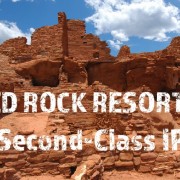Selling Growth While Cashing Out
Read our updated report, “Selling Growth While Cashing Out”.
Is the Las Vegas locals market in decline? Data from the Nevada State Gaming Control Board show a continuing decline in the number of slot machines in the Las Vegas locals market since 2009. This is accompanied by a similar decline in the total amount wagered by customers in the locals market. Both total slot units and amounts wagered have declined to 2003 levels. Station Casinos derives “approximately 80% to 85%” of its gaming revenue coming from slot play.
Why is Red Rock Resorts selling hard-to-come-by casino sites? Historically, Station Casinos built its leading position in the Las Vegas locals gaming market by acquiring a portfolio of competing locals casinos and undeveloped land shielded from competition thanks to Nevada’s SB 208 legislation. The company touts its gaming-entitled land holdings in its IPO prospectus, but it has not disclosed that some of its casino sites are now on the market or explained why it is ceding some of its “highly desirable” and “strategically located” gaming-entitled locations in Las Vegas.
When will Red Rock Resorts grow again? Station Casinos has seen little growth in its core Las Vegas business over the last several years. Casino revenues from its properties in Las Vegas barely increased from 2009 to 2014, with a compound annual growth rate of only 0.07%. A significant portion of the company’s EBITDA growth over the past three years has come from its tribal casino management agreements, but the company has not signed a new tribal casino development agreement in over a decade.
Investors deserve better analysis of Las Vegas economic conditions. We reviewed how the company in its IPO filings describes certain of its own key metrics for understanding the Las Vegas economy and the potential for growth in the Las Vegas locals gaming market (e.g. average weekly wages and home value appreciation). When Station Casinos says that it believes the Las Vegas locals gaming market is one of the most attractive in the U.S. because of, among other things, “its strong economic and demographic fundamentals,” what is the company talking about? How confident is the company in its claims?
- Download our unauthorized roadshow presentation, “Red Rock Resorts: A Second-Class IPO” here.
- The insiders are cashing out at a high price compared to the company’s estimated equity.
- Growth concerns in the company’s primary Las Vegas locals market and the lack of new development agreements in the tribal gaming market.
- The tax receivable agreement could drain substantial amount of cash out of the company and affect free cash flow.
- The dual-class structure will make public investors second-class shareholders.
- The lack of disclosure regarding the regulatory problems of Deutsche Bank, a 25% current owner.











